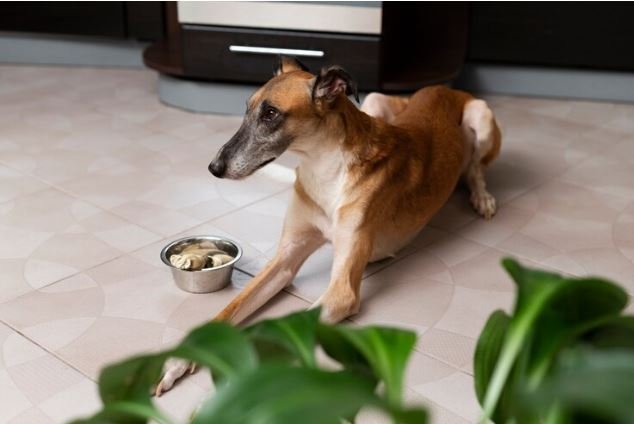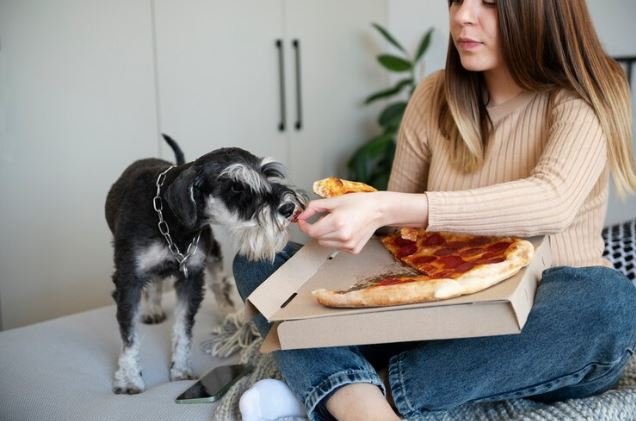Homemade Food for Dogs to Gain Weight
Weight management is vital for the overall health and well-being of your pooch.
Changing the weight of a dog in some cases might be just as hard. Certain dogs may also struggle to keep a healthy weight, whether due to poor appetite from being unwell or fancy eaters.
Understanding Why Some Dogs Need to Gain Weight
But first, before we start talking about recipes and ways of helping your dog gain weight, you need to establish WHY they might be underweight. Causes of a Dog Being Too Thin
Metabolic Disorders:
For example, conditions like hyperthyroidism can up the calorie-burning quotient and result in weight loss even without decreased appetite.
Digestive Issues:
Gastrointestinal issues that prevent a dog from properly absorbing nutrients could result in weight loss.
High Energy Levels
Very active Dogs or those belonging to working breeds may burn more calories than they consume, leading to a leaner body.
Diet:
If the dog does not have enough calories, proteins or fats may be placed in an underweight status.
Age:
Older dogs may lose more muscle mass and require fewer calories to maintain their weight.

Key Nutrients for Weight Gain in Dogs
However, if you are making home-cooked food for weight gain in dogs then it is important to use highly nutrient-dense ingredients that promote the healthy addition of a calorie-rich property. Focus on these key nutrients:
Try to consume good protein sources, such as chicken and lean cuts of beef. Protein will provide the basic building blocks for your muscles!
Healthy Oils: Get your healthy fats. (Fat holds more calories per gram than protein or carbs.) Employ healthy fat sources like chicken skin, fish oil or flaxseed oil.
Carbs: Carbohydrates give energy, which has great importance in weight gain. Include fibrous carbs such as brown rice, sweet potato and oats
Vitamins and Minerals Ensure your diet is not deficient in necessary vitamins or minerals (from whole foods or supplements)
Fibre is not directly a contributor to weight gain but as dogs have digestive systems which derive energy so with proper function of this system you can be assured that it will absorb these nutrients correctly.
Homemade Recipes to Help Your Dog Gain Weight
A few homemade weight gain recipes you can consider preparing for your dog include; The best dog food recipes are the one you prepare yourself because they taste much better and natural and is also a healthy diet.
Chicken and Sweet Potato Meal
Ingredients:
- 1 pound of ground chicken
- 2 Sweet Potatoes, large and peeled & diced
- 1 cup of cooked brown rice
- 2 tablespoons of olive oil
- ½ cup of peas (optional)
- Fish oil (optional) 1 tablespoon.
Instructions:
Prepare the Sweet Potatoes:
Add your chopped sweet potatoes into a large pot, and boil them until soft (about 15 minutes). Drain and set aside.
Cook the Chicken:
Heat 2 tablespoons olive oil in a large skillet over medium heat. Add ground chicken, and cook until completely browned.
Combine Ingredients:
Add the cooked chicken to a large mixing bowl along with sweet potatoes and brown rice. Mix until well combined.
Add Peas and Fish Oil:
Add peas and fish oil if using. These ingredients also help add more nutritional value and good fats to the meal.
Cool and Serve:
You must allow the mixture to cool COMPLETELY before trying it. Serve an appropriate amount based on your dog’s size and dietary needs.
Leftovers of this meal can be refrigerated for a maximum of five days, or frozen away in individual containers for future use.
Beef and Brown Rice Mix
Ingredients:
- 1 lb. ground beef, the fattier the better
- 1 cup of brown rice, cooked
- 2 large carrots, grated
- 1 tablespoon of flaxseed oil
- 1 egg, lightly beaten
- 1/4 cup cottage cheese (optional, for increased protein)
Instructions:
Cook the Brown Rice:
First, cook the brown rice according to package instructions. Set aside once cooked.
Cook the Beef:
In a large skillet over medium heat, add ground beef and cook until browned. Drain any fat (if desired, but a little is good for flavour).
Prepare the Carrots and Egg:
Add the shredded carrots to the same pan and fry for 5 minutes. Stir in the beaten egg and cook until fully scrambled with beef.
Combine Ingredients:
In a large bowl, combine the beef mixture with cooked brown rice and flaxseed oil followed by cottage cheese. Mix thoroughly.
Cool and Serve:
Using Scramble It can allow the meal to cool off before giving it out to your dogs. Leftovers can be kept in the fridge for 4 to five days.

Tips for Helping Your Dog Gain Weight
Although this method may seem less appealing than larger portion sizes or making homemade food for dogs to gain weight, you have several other options in your arsenal.
Offer multiple small-size fat feedings: Instead of feeding two large-size meals a day, consider serving several smaller-sized servings throughout the 24 hours. This way, it will add calories to your dog’s diet without plopping out of them instantly.
If you are at a loss, give her some doggie weight gain supplements or plugins. They provide extra calories, as well as nutrients.
Weigh your dog weekly This way you will know if those dietary changes are doing any good or if they need some more tweaking.
Gradually Increase Caloric Intake: First of all, it is necessary to gradually increase your dog´s daily caloric intake in order not to cause digestive problems. The same thing goes for added calories too soon, which can result in GI problems.
High-Value Treats: High-calorie treats are ts available all day. Opt for high protein or healthy fat treats.
Common Mistakes to Avoid When Trying to Help Your Dog Gain Weight
How to Properly Put Weight on a Dog This article will detail some of the most common mistakes that could be derailing your dog from optimally gaining weight;
Feeding the Load Too Many Foods: Gives your dog a digestive problem and not necessarily a healthy gainer
Weight Changes: Extreme weight loss or difficulty gaining can be a sign of an underlying health problem. Remember, when it comes to your dog’s weight always ask a vet.
Low-Quality Ingredients: If you make food yourself, use only the highest quality ingredients. Poor-quality food may not have the essential nutrients to help you healthily gain weight.
Missing Out Exercise Although it might not seem like a workout is vital. It assists with growing muscle, and it boosts appetite.
Most Asked Questions
What are the best ingredients for homemade dog food to help with weight gain?
Some of the best ingredients include high-quality proteins such as chicken or beef, healthy fats like olive oil or fish oil, and complex carbs including sweet potatoes or brown rice. It still supplies you with all of the calories and nutrients that your body needs to grow, which is key for healthily gaining weight.
How much should I feed my dog to help it gain weight?
How much you must feed will depend on the size, age and activity level of your dog to help them put weight back on. Offer a small portion increase and monitor your canine body weight, then adjust accordingly.
Can I mix homemade food with commercial dog food to help my dog gain weight?
Now of course mixing homemade food with commercial dog kibble will be an effective way to how you are giving the requisite amount of calorie content that your precious pooch should intake and this also ensures it gets a balanced diet. Use high-quality commercial food that even better complements these vet-approved homemade dog recipes.
Is it safe to add supplements to my dog’s homemade food for weight gain?
While supplements are helpful, you must pick ones specifically made for dogs and talk to your vet before incorporating them into (… Vice versa.) your canine’s diet. However, you can overdo it with supplements which then creates imbalances.
How long will it take for my dog to gain weight with homemade food?
So, how long it takes for a dog to gain weight really will depend on the individual dog’s metabolism and activity level as well as careful management of an appropriate feed allowance in other words just keep feeding. It might take several weeks to a few months for your cat(”s) body weight and condition to get back in balance on this new, homemade diet.
Conclusion
Preparing homemade food for dogs to put weight on is a viable option that enables you with the control of knowing what and how much your dog eats. You can do this by providing meals high in calories, protein and healthy fats tailored to your dog’s needs which will enable you to help your dog reach a safe targeted weight for them so that they are the correct size. Always stay consistent, and be sure to evaluate your dog along the way for optimal results. Dogs are individual dogs and if in doubt please seek advice from your veterinarian before deciding on a plan.
